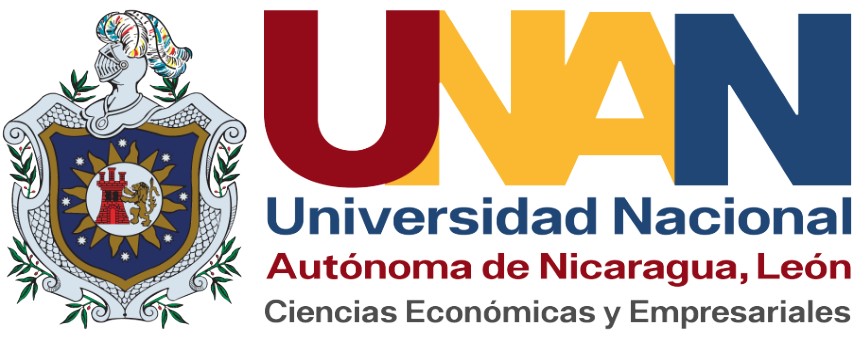Circular economy practices immersed in shared value
DOI:
https://doi.org/10.5377/aes.v4i1.16157Keywords:
Shared Value, rethinking, cluster, circular economy, competitivenessAbstract
Business competitiveness determines the possibility of profitability in the markets, the Shared Value (SV) provides alternatives through its axes for competitive development. The rise and presence of strategic thinking towards sustainability and respect for the environment, such as Circular Economy (CE) practices are applied in parallel and superficially within the SV or the opportunity to use the principles with actions to Reduce, Reuse, and Recycle (3Rs) of the CE are wasted. Indicators of companies in the Bogotá-Region that apply the 3Rs are described within the axes such as rethinking of products and markets, redefining productivity in the value chain and enabling the development of SV clusters, through content analysis of written communication of 270 companies compiled by the Organization of Ibero-American States (OEI) and the Bogota Chamber of Commerce (CCB).The classification in units of analysis of the 3Rs framed in categories for each axis is executed. It is presented the contribution to each of the SV axes carried out by 31 companies, classified by size, from the execution of projects involving the 3Rs. It was found that 32% of these projects aim mainly at the first axis, 68% at the second axis while no project involves the third axis. It concludes the little adoption of the CE as part of the SV ignoring its implementation to generate better competitiveness.
Downloads
References
Artunduaga, F., Parra, R., & Ceballos, G. (2019). Fundamentals epistemological of business administration: regional analysis induction to central. Opción, 35 (25), 1483-1525. Recuperado de https://www.produccioncientificaluz.org/index.php/opcion/article/view/32345/33759
Bardin, L. (2002). Análisis de contenido (3a. ed.). (C. Suarez, Trad.) Madrid: Ediciones Akal S.A. Obtenido de https://books.google.com.co/books?hl=es&lr=&id=IvhoTqll_EQC&oi=fnd&pg=PA7&dq=an%C3%A1lisis+de+contenido&ots=0Hx_fvpUsX&sig=-ikyrA-SJ3vABPwVdjcRnLITSII#v=onepage&q&f=false
Barrios, M., & López, N. (2013). Creating Shared Value in the Educational sector. Master Thesis. Umea School of Business and Economics. Recuperado de https://www.diva-portal.org/smash/get/diva2:709480/FULLTEXT01.pdf
Benyus, J. (2021). Biomímesis Innovaciones inspiradas por la naturaleza. Barcelona: Tusquets Editores S.A.
Bockstette, V., Pfitzer, M., Smith, D., Bhavaraju, N., Priestley, C., & Bhatt, A. (2014). Banking on shared value: How banks profit by rethinking their purpose. FSG. Recuperado de: https://search.issuelab.org/resource/banking-on-shared-value-how-banks-profit-by-rethinking-their-purpose.html
Braungart, M., & McDonough, W. (2005). Cradle to Cradle. (De la cuna a la cuna): Rediseñando la forma en que hacemos las cosas. (A. García, Ed. , & G. Pérez, Trad.). Madrid: Mcgraw-Hill.
Cámara de Comercio de Bogotá. (2019). La Cámara de Comercio de Bogotá entregó el sexto Premio Valor Compartido. Obtenido de ccb.org.co: https://www.ccb.org.co/Sala-de-prensa/Noticias-CCB/2019/Diciembre-2019/La-Camara-de-Comercio-de-Bogota-entrego-el-sexto-Premio-Valor-Compartido
Ceballos, G., y Muñoz, M. (2022). Economía circular: elemento clave en la ventaja competitiva. Apuntes de Economía & Sociedad. 3(1), 4-6. https://doi.org/10.5377/aes.v3i1.14281
Chávez, B. (2021). Walter R. Stahel: «Cuando les hablé de economía circular en 1976, fue decepcionante la nula reacción de los responsables polí́ticos». Obtenido de https://www.mujerhoy.com/actualidad/walter-stahel-economia-circular-reciclaje-empleos-20211225155144-nt.html
Congreso de Colombia. (1994). Ley 165 de 1994. Recuperado de https://www.funcionpublica.gov.co/eva/gestornormativo/norma.php?i=37807
Congreso de Colombia. (2012). Ley estaturaria 1581 de 2012. Recuperado de https://www.funcionpublica.gov.co/eva/gestornormativo/norma.php?i=49981#:~:text=Definici%C3%B3n.,libre%20consulta%20para%20los%20ciudadanos.
Crane, A., Palazzo, G., Spence, L., & Matten, D. (2014). Contesting the Value of Creating Shared Value. California Management Review, 56(2), 130–154. https://doi.org/10.1525/cmr.2014.56.2.130
Díaz, N. y Castaño, C. (2013). El valor compartido como nueva estrategia de desarrollo empresarial. International Journal of Good Conscience, 8(2), 82-100. Recuperado de: http://redvalorcompartido.com/TEXTOS/El%20valor%20compartido%20como%20Nueva%20estrategia%20de%20desarrollo%20empresarial.pdf
Díaz, N. (2015). La creación de valor compartido: estrategia de sostenibilidad y desarrollo empresarial. Cultura Latinoamericana, 22(2): 207 – 230. Recuperado de: https://editorial.ucatolica.edu.co/index.php/RevClat/article/view/1629
Ellen MacArthur Foundation. (2017). Economía circular. Recuperado de https://www.ellenmacarthurfoundation.org/es/economia-circular/concepto
Ellen MacArthur Foundation. (2017). Escuelas del pensamiento. Recuperado de https://www.ellenmacarthurfoundation.org/circular-economy/concept/schools-of-thought
Galvis, N., Vanegas, A., y Méndez, M. (2018). Diseño de un modelo teórico para la medición de valor compartido en empresas colombianas. Revista Ploutos, 8(2), 60-71. https://doi.org/10.21158/23227230.v8.n2.2018.2200
Hawken, P., Lovins, A. B. & Lovins, L. (1999). Natural Capitalism: Creating the Next Industrial Revolution. New York: Little, Brown & Company.
Hernández, R., Fernández, C., y Baptista, P. (2014). Metodología de la investigación (6ª ed.). México D.F.: McGraw Hill Education.
Hernández, R., Méndez, S. y Mendoza, P. (2014). Metodología de la investigación (6ª ed.). México D.F.: McGraw Hill. Recuperado de http://highered.mheducation.com/sites/1456223968/student_view0/index.html
Kramer, M. R., Peterson, K., Rehrig, M., Stamp, M., & Kim, S. (2012). Competing by saving lives: How pharmaceutical and medical device companies create shared value in global health. Madrid: FSG.
Krippendorff, K. (2018). Content analysis. An introduction to its methodology (Fourth ed.). Thousand Oaks, California: SAGE.
Krippendorff, K., & Bock, M. (2008). The Content Analysis Reader (1st ed.). Thousand Oaks, California: SAGE.
Letelier, M., Flores, F., & Spinosa, C. (2003). Developing productive customers in emerging markets. California Management Review, 45(4), 77-103. https://doi.org/10.2307/41166189
López, D. (2018). Economía azul. Recuperado de https://economipedia.com/definiciones/economia-azul.html
Melamed, E., Blanco, A. & Rodríguez, G. (2018). Creación de valor compartido: estado y contribuciones a la sostenibilidad corporativa. Revista Escuela De Administración De Negocios, (85), 37-56. https://doi.org/10.21158/01208160.n85.2018.2047
Méndez, M., y Gómez, M. (2017). Factores incidentes para crear valor compartido en las mipymes de Bogotá. Suma de negocios, (8), 96-105. https://doi.org/10.1016/j.sumneg.2017.10.003
Michelini, L., & Fiorentino, D. (2012). New business models for creating shared value . Social Responsibility Journal, 8(4), 561-577. https://doi.org/10.1108/17471111211272129
Morillo, M. (2005). Análisis de la Cadena de Valor Industrial y de la Cadena de Valor Agregado para las Pequeñas y Medianas Industrias. Actualidad Contable Faces, 8(10): 53-70. Recuperado de https://www.redalyc.org/pdf/257/25701006.pdf
Muñoz-Martín, J. (2013). Ética empresarial, responsabilidad social corporativa (RSC) y creación de valor compartido (CVC) . Revista Globalización, Competitividad y Gobernabilidad, 7(3): 76–88. https://doi.org/10.3232/GCG.2013.V7.N3.05
Odia, J. (2018). Created Shared Value and Sustainable, Inclusive Development of Developing Countries. University of Benin, 122-153. http://doi:10.4018/978-1-5225-3147-0.ch006
Orr, S., & Sarni, W. (2015). Does the concept of “creating shared value” hold water? . Journal of Business Strategy, 36(3): 18–29. https://doi.org/10.1108/JBS-10-2013-0098
Pauli, G. (2015). La economía azul. 10 años, 100 innovaciones, 100 millones de empleos. Barcelona: Booket.
Pfitzer, M., Bockstette, V. & Stamp, M. (2013). Innovating for shared value. . Cambridge, United States: Harvard Business School Publishing Corporation.
Porter, M., & Kramer, M. (2011). Creating Shared Value. Harvard Business, 89(1):31–49. Recuperado de https://www.communitylivingbc.ca/wp-content/uploads/2018/05/Creating-Shared-Value.pdf
Porter, M., Hills, G., Pfitzer, M., Patscheke, S., & Hawkins, E. (2011). Measuring shared value: How to unlock value by linking social and business results. Madrid: FSG.
Rubio, M. (2014). Economía circular: cradle to cradle (de la cuna a la cuna). Recuperado de: https://www.eoi.es/blogs/miguelangelrubiocandeal/2014/03/31/economia-circular/
Spitzeck, H. & Chapman, S. (2012). Creating shared value as a differentiation strategy – the example of BASF in Brazil. Corporate Governance: The international journal of business in society, 12(4), 499-513. https://doi.org/10.1108/14720701211267838
Stahel, W. (2019). Economía Circular para todos: Conceptos básicos para ciudadanos, empresas y gobiernos. (M. González Vásquez, Trad.) Traverse City, Michigan: Independently published.
Szmigin, I. & Rutherford, R. (2013). Shared value and the impartial spectator test . Journal of Business Ethics, 114(1), 171–182. https://doi.org/10.1007/s10551-012-1335-1
Tillman, J. (1994). Regenerative design for sustainable development. New York: Wiley and Sons.
Vaidyanathan, L., & Scott, M. (2012). Creating Shared Value in India: The Future for Inclusive Growth. Vikalpa: The Journal for Decision Makers, 37(2).
Published
How to Cite
Issue
Section
License
Copyright (c) 2023 Universidad Nacional Autónoma de Nicaragua, León

This work is licensed under a Creative Commons Attribution-NonCommercial-ShareAlike 4.0 International License.














